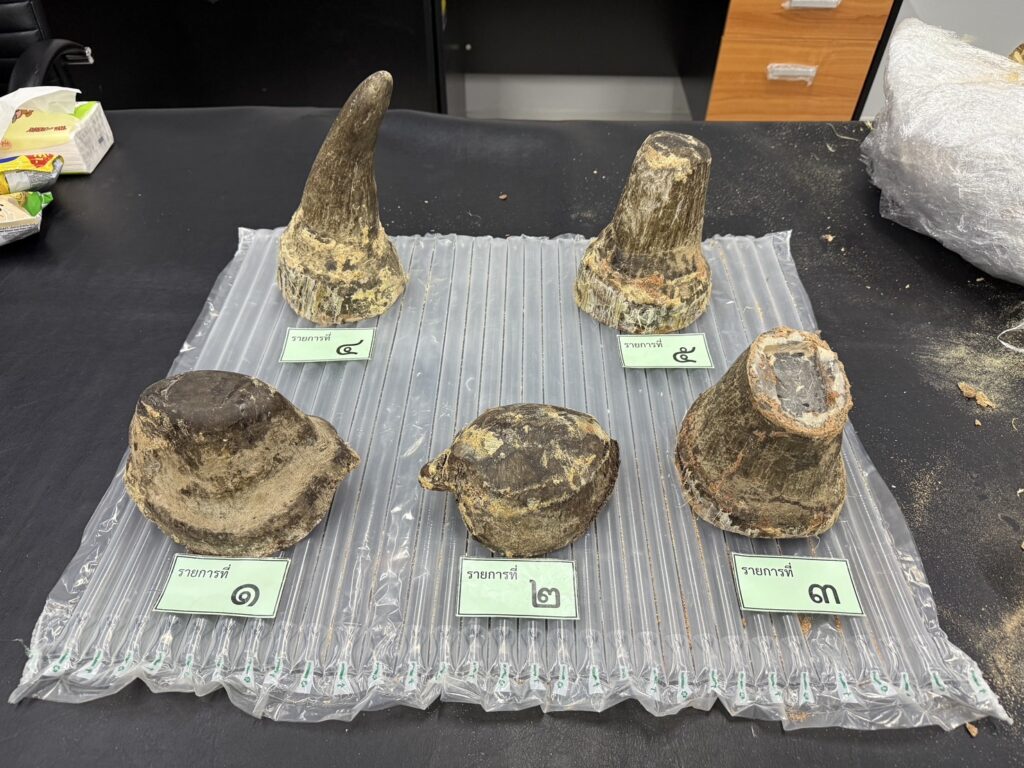BANGKOK – Thai customs officials detained a Vietnamese national at Suvarnabhumi Airport on Friday evening after he tried to smuggle rhino horns valued at 6.9 million baht (about US$200,000) through Thailand into Laos. The arrest was part of a broader push to stop illegal wildlife trafficking under CITES rules.
Mr. Panthong Loykulnan, a spokesperson for the Customs Department, said this effort highlights Director-General Thirat Attanavanich’s commitment to stricter measures to protect endangered animals, both within Thailand and beyond its borders.
The suspect had travelled from Luanda, Angola, transferred in Addis Ababa, Ethiopia, and landed at Bangkok’s main airport. He was set to fly onwards to Vientiane, the capital of Laos.
Customs officials at Suvarnabhumi reasoned the man posed a risk, given data from screening systems and intelligence reports linked to wildlife smuggling. At 7:45 PM on 6 September, during a routine check, officers found five pieces of rhino horn hidden in his bags. The total weight came to 6.86 kilograms.
Wisanu Watcharavanich, Director of the airport’s Passenger Inspection Customs Office, directed teams to enforce anti-trafficking policies more strictly to block illegal trade through Thai airports.
The suspect now faces charges under Thailand’s Customs Act of 2017, the Wildlife Conservation and Protection Act of 2019, and the Animal Epidemics Act of 2015.
The Customs Department stressed the importance of teamwork with other agencies, sharing data and acting quickly to disrupt groups moving protected wildlife under CITES regulations. They aim to protect both communities and the natural environment.

The Smuggling of Rhino Horns
Smuggling of rhino horn in Asia continues to support illegal wildlife markets, driven by strong demand in China and Vietnam. Many believe the horn has medical uses or see it as a sign of wealth.
In countries like Vietnam and China, rhino horn is used in traditional medicine. Some think it can treat fever, rheumatism, or cancer, although studies show no such effect. It is also popular as a luxury gift and status symbol. The trade now extends beyond medicine to expensive trinkets and jewellery.
Most rhino horns come from Africa, especially South Africa, which is home to about 80 percent of the global rhino population. Criminal groups ship the horns to Asia using secret, shifting routes.
These criminal networks often change tactics to stay ahead of police and customs. Investigations have even linked North Korean diplomats to the trade. Both Chinese and Vietnamese criminal groups play key roles.
Authorities report some progress with stronger enforcement and public awareness campaigns, but the ongoing demand and issues like corruption make the fight against poaching difficult.
Legalizing the trade would likely make things worse, as it could make rhino horn seem acceptable and open new markets for traffickers.














